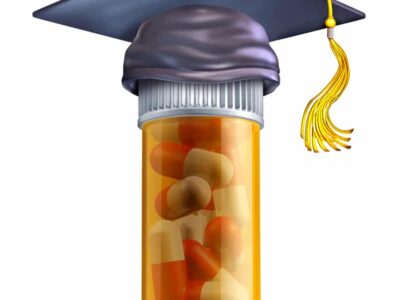
If you or your college student is struggling with addiction — Contact us right away at 855-299-4472.
Many parents have experimented with drugs or alcohol in the past and may think that it’s no big deal. Although little do they know, addictions are often formed before a person turns 21, and bad habits developed in young adulthood can plague a person into old age.
Rather than waiting years for addiction to become increasingly severe, Behavioral Health Centers wants college students and their loved ones to be mindful of the warning signs now so that you can stop a small problem from turning into a catastrophe.
A Reality Check About Substance Abuse In College
Going to college comes with its rewards and excitement for new experiences and encounters, including new surroundings, roommates, classes, making friends, parties, etc. However, school always comes with its not-so-glamorous parts too.
College substance abuse is rampant across the country. Students should be aware of drug and alcohol culture on their campuses. While some colleges are dry, meaning no drugs or alcohol allowed, wet campuses display the use of alcohol drugs, including prescription drugs such as Adderall.
While substance abuse in college is not as taboo as it used to be, the casual attitude towards drug use and drinking can make the use of substances appear less risky, when that can be farther from the truth.

Here are some important statistics about college substance abuse:
- Approximately 80 percent of college students in the United States have abused alcohol.
- In 2016, 4.9 percent of college students used marijuana in comparison to 2.8 percent in 1996.
- In 2006, 9.9 percent of college students reportedly used Adderall compared to 6.2 percent of non-college-bound peers. Addiction to Adderall is very common.
- An estimated 110,000 students ages 18-24 are arrested every year for alcohol-related incidences or violations, such as public intoxication or driving under the influence.
- According to the National Institute on Alcohol Abuse and Alcoholism, an estimated 38 percent of full-time college students aged 18-22 reported binge drinking within the past month.
Common Substances Abused in College
According to USA Today, half of the full-time college students in America admit to binge drinking or using drugs at least once a month. The most commonly used substances abused by students in college include the following:
- Alcohol
- Marijuana
- Prescription drugs (stimulants such as Adderall, depressants, and narcotics)
- Over-the-counter drugs
- Cocaine
- Heroin
- Ecstacy
- LSD
Drug and Alcohol Culture at College
Among many college students, drugs and alcohol are often accepted and seen as a normal part of everyday life the “college experience” so to speak. Many universities handle any misdemeanors with substance abuse internally to protect their reputation. Unfortunately, this tolerance culture and destigmatization of marijuana and alcohol, in particular, is contributing to the major visible increase in drug and alcohol use, as well as, making access to them easier.
Despite this, a variety of resources for college students are available to help them stay above this casual attitude towards substance use on campus and avoid being a statistic of addiction.
Early Intervention For Addiction In College Students is Essential
You may know from personal experience or from watching television, but college is frequently a time for heavy substance abuse. Binge drinking, drug experimentation, and risky behavior, in general, are all closely linked to the college years and are often considered rites of passage. Although it would be great if there was no substance abuse happening on college campuses, this is closer to a fantasy than a reality.
Research shows, that approximately 70 percent of high school students have tried alcohol and about half have taken an illicit drug by the time they are seniors. People are most likely to begin using and abusing drugs and alcohol as adolescents and young adults. Some do it to try to have fun, others do it to fit in and some also do it to help academic performance. Whatever the reasons, young adult and adolescent substance abuse can prove problematic later in life.
“The majority of people who have a SUD developed it before age 20.”
This is a critical window for the development of substance use disorders (SUDs), as the brain is still developing. Although most teens and young adults will not progress past experimentation to a fully developed SUD, even experimentation can be dangerous. The majority of people who have a SUD developed it before age 20, and the likelihood of developing a SUD is greater for individuals who begin using it as teenagers.
10 Signs of drug use in college students
It’s critical for parents, siblings, and close friends of college students to watch out for potential signs of drug or alcohol addiction. However, without being around the person 24/7, how can you be sure if a person is abusing drugs or alcohol? Here are 10 warning signs of drug abuse in college students that people should know.
1. Failing Grades
Academics will often be the first thing to suffer when a student is struggling with substance abuse. Drug and alcohol use can cause sleeping problems and disrupt a person’s life to the point where there is little time for school work.
2. Skipping Classes
This is related to academic performance and could be indicative of shifting priorities; meaning that your student may choose to get high or drunk over going to class. This is problematic for an endless number of reasons. Several studies have found that a large percentage of college academic problems and dropouts are alcohol and/or drug-related.
3. Sleeping During the Day
It’s hard to stay awake and be alert during the day if you spend your evenings and early morning hours abusing drugs or alcohol. Finding your college student asleep at 3:00 pm on a weekday could be a sign that something’s up.
4. Unexplained Financial Difficulties
We all know that most college students have very little money because they are spending their time in school instead of working. However, you may have an idea of how much money your son or daughter makes at a part-time job, or you may even be their income source. Try to be aware of what he or she is spending money on; having no cash and nothing to show for it may indicate they’ve been spending on drugs.
5. Sudden Mood Swings
Continuous drug and/or alcohol use will cause changes in the brain and negatively affect a person’s mood. Alcohol abuse can lead to increased depression, anxiety, or anger, just as different drugs can lead to symptoms of mental distress.

6. Questionable Hygiene and Appearance
When a person is focused on doing drugs and drinking alcohol, it can be easy for him or her to neglect basic hygiene. If your son or daughter seems to always be unkempt, substance abuse could be the reason.
7. Mixing Drugs
You may not have a problem with your son or daughter drinking because it’s legal. But if your college student starts mixing those drinks with prescription pills or over-the-counter drugs, it could be a sign that he or she has developed tolerance and needs more substances to achieve the desired high. This is one of the tell-tale signs of an addiction-forming.
8. Family History
A person’s family history is strongly linked to his or her propensity to develop an addiction. If you or someone else in your family has a history of addiction, be sure to pay extra close attention to your college student.
9. Lack of Motivation
Has your college student gone from trying to join every club possible to just sitting on the couch? Continuous drug and/or alcohol abuse will lead to lethargy and a lack of motivation to do anything else but get intoxicated.
10. Inability to Make Contact
Have you been getting the feeling that your son or daughter avoids making eye contact with you? Does he or she not return your phone calls or avoid spending time with family? Substance abuse and addiction can cause a person to withdraw from those who are closest. If your daughter has suddenly become difficult to reach, it could be because she’s hiding substance abuse.
College Substance Abuse and Where to Draw the Line
Whether binge drinking on the weekends, using drugs such as Adderall to study or stay on top of a heavy workload, getting stoned to relieve stress, substance abuse among college students is always going to be present.
Unfortunately, sometimes it can be difficult to tell when the use of drugs and/or alcohol becomes abuse when a large number of people are doing it. The cycle of addiction is often gradual but sneaks up quickly.
Therefore, college students need to be mindful of their habits to avoid substance dependence, abuse, and addiction. Substance abuse gets out of hand quickly, leading to physical and mental health problems. This leads to failing classes and most importantly, personal and professional issues as functioning normally on a daily basis becomes a task within itself.
Truth is, the physical, mental, and social problems of substance abuse can be avoided or treated if college students can recognize the signs of their problem and address it as quickly by asking for help as soon as possible at a professional rehab facility.
Recovery From Substance Abuse In College Students is a Reality

It is important to note, that recovery from college substance abuse is different for everyone. Addiction in college students largely depends on a variety of factors including the type of substance abuse, how long it has manifested, the severity, if any mental illness is present, etc. Factors such as family history and mental illness and method of use can also majorly affect an individual’s recovery and severity of withdrawal symptoms.
College students who recognize their substance abuse problem, and choose to seek professional help, should know that recovering while attending school is not an easy feat, but it is possible. Addiction in college students can be treated! There are various treatment resources students and their loved ones can use to help them stay on track with both their recovery process and studies.
Behavioral Health Centers Can Help You Recover!
Whether you uncover a substance abuse problem in a 20-year-old or a 70-year-old, immediate treatment is the best possible option. The longer you let addiction run wild without professional rehab, the worse it will get.
Behavioral Health Centers works with patients of all ages and their families to help them reclaim their lives and achieve lasting sobriety. Contact us today to begin the road to sobriety.





